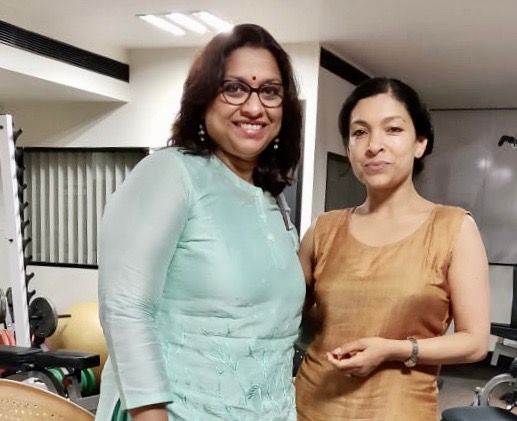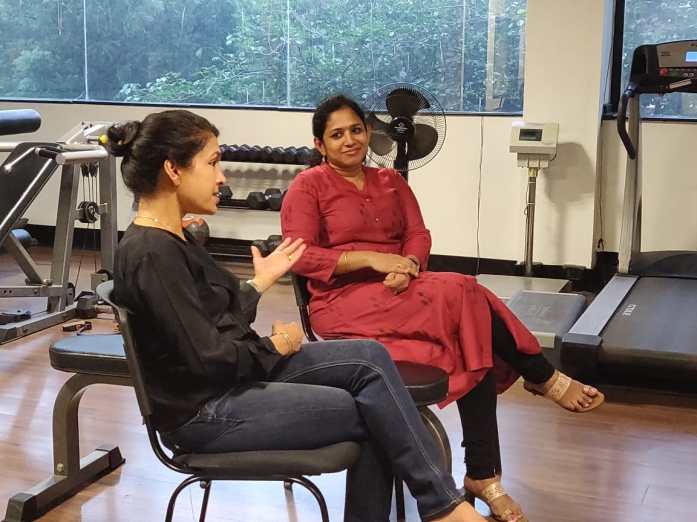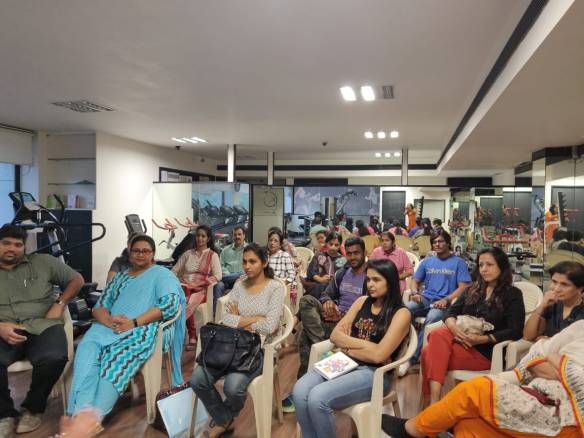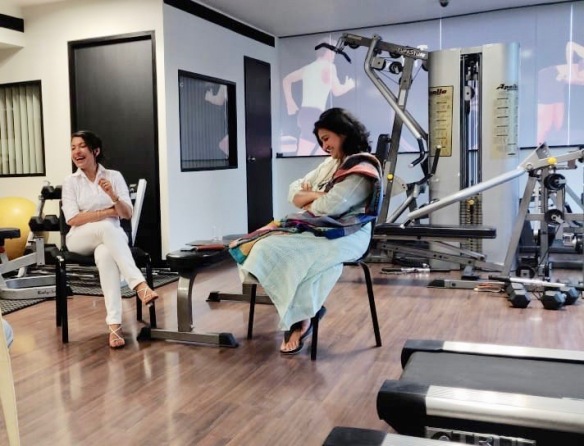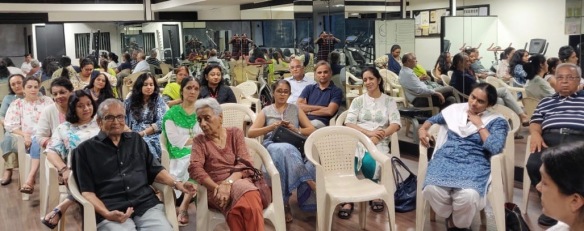A conversation between two Obstetricians, Dr Sheela Nambiar (SN) and Dr Uma Ram (UR) at the TFL Fitness Studio, Chennai on their experience with dealing with women through a large part of their lifespan. The paradigm shifts they see, women’s attitudes towards their health and more.
SN – I am sure all of you know Dr Uma Ram. She is a very popular Obgyn in Chennai who runs EVKMC and Seethapathy hospital. She is currently the chairperson for MRCOG south zone and very involved with teaching besides her clinical work.
I wanted to do this with her as both of us are Obgyns. It has been an interesting journey for me over more than two decades as I am sure it has been for you too Uma. This conversation is about insights into what it is like to deal with women through their life spans. For instance, I had a woman who I had delivered 24 years ago bring her daughter, who is now pregnant to me. It’s at times like this that it occurs to me just how long I’ve been doing this!
SN – What has your experience been like over the last 2 decades? Have things changed much? How are women approaching their health today?
UR – Yes and no. Access to information has increased because of the internet. But I think the fundamental issues remain the same because, we as women, don’t prioritise our health.

SN – We often start seeing patients as teenagers, now even earlier, because many of them attain menarche at 10 and 11 years. These kids are brought in by their parents with complaints of a heavy/irregular period or with a ‘diagnosis’ of PCOS. Besides these complaints and ‘labels’, do you think there’s a conversation that’s missing that we, as Obgyns can be part of?
UR – Yes a couple of conversations. I do have them when the opportunity presents itself. One is diet, fitness and lifestyle. Another conversation is about sexual health and hygiene.
SN – The exposure to sexuality is much more prevalent now. The parents may not acknowledge it. As Obgyns if we can broach the subject of protection, and prevention of sexually transmitted diseases and how to say ‘no’, it would help immensely.
UR – I agree. I have run into problems with parents while initiating this conversation. Some feel having this conversation, encourages their kids to go down that road! I find there is a certain level of naivety or blind confidence with many young girls when we have this conversation. They often say, ‘Why are you telling me this? Yes I have a boyfriend, yes occasionally we have sex but I’m sure I won’t contact anythign or get pregnant’.
SN – What is most tragic is when a young girl gets pregnant and is afraid to tell anyone at home. I have had girls brought to me by the family almost 8 months pregnant, undiscovered until that point having hidden her condition under loose clothes! One can only imagine the trauma she has gone through covering this up for 8 months.
Talking about PCO, and being over weight, the parent often only wants the symptoms to disappear, not realising that the lifestyle is problematic. Can you talk about the future repercussions of a young girl being diagnosed with PCOS?
UR – There’s more to it than just irregular periods. It takes time for the hormonal cycle to settle in and tlll such time you could have irregular period. Every girl with irregular period doesn’t have PCOS but if there is genuinely a hormonal imbalance, then it becomes important to communicate that there is no cure. You can keep it under control with exercise and diet. To some extent medication will work.
SN – The predisposition to gestational diabetes, diabetes, heart problem etc. are more prevalent for a girl who is obese with PCOS. While it seems premature to tell a young girl all these things, these are the realities and they have to be aware that they setting themselves up for all these problems later on in life. If they get themselves a good fitness routine and a healthy diet, it will certainly help them with these very symptoms and later on to prevent other problems
UR –There is also very good data that the babies born to mothers who have had diabetes in pregnancy are more at risk for obesity and cardiovascular disease at a younger age. We don’t realise the potential cardio vascular risk for women. When younger, we are protected from heart disease because of the estrogen. But once you are post menopausal, especially if you are someone who has had diabetes and/or high blood pressure in pregnancy, the risk of having cardiovasuclar disease later on life is quite high.
SN – True. We always consider men as being more prone to heart attacks. The risk is equal once the woman attains menopause and more so for those with metabolic syndrome, obesity etc. I think this has to be stressed to women.
We were just talking earlier about the choices women have. Unlike in the west, where women domostly make their own decisions, here most women cannot. In India everyone from the uncle to uncles uncle … have a say in the matter!
UR – It amazes me for instance that during labour even if the woman wants epidural for pain relief, she will need to ask the mother-in-law! These are upper middle class, educated people who you want to believe are empowered. I sometimes wonder about empowerment if you can’t make the choice for your own pain relief.
I will never forget this incident, wherein this woman had come with her to discuss the date for induction of labor. The very next day someone from her husband’s family, claiming to be the uncle came to ask me if the girl had chosen the date herself. I explained that we had given her an option and she had said she would discuss it and get back to us. When the girl came in for admission, she revealed to me that the husband’s family had been very upset and the husband abusive, short of hitting her, because he thought she had made the decision on her own!
SN – Is it a no win situation for women in India? For a majority of women they are not allowed to make decisions.
To the audience – how has it been for you all?
Guest 1 – I live in a joint family so I had no choice with even bringing up my children! It was all done very lovingly though. They would tell me it is a ‘joint decision’.
UR – It also depends on the relationship between the couple. If they have a good relationship, they put it across to the elders in the family in such way that they get what they want. That is possible. I am not saying it always goes against what the woman wants but what I am saying is, more often than not, it’s not her absolute decision. It always needs validation from the family
SN – Post 40 years many women start to come into their own.They may say, ‘to hell with society’, not necessarily rebelliously, but they really want to ‘find themselves’. Many find they are bolder and want to make bolder, independent choices. Could that be the age/maturity or hormones. What is your opinion on that ?
UR – I think it’s because they feel that their responsibility to their children is done. They have the time and space.
SN – Around the peri menopausal period, the children have left a home, perhaps the husband has his own life, bunch of friends etc. Maybe she is home and doesn’t have much to do. The hormones are falling….. it’s a combination of many things. Yes depression is very common around the peri menopausal age.
So the conversations usually start with ‘what else can I do?’. I advise them to start with exercise. One can exert control over that one hour in a day and then, when you get control of your body, see it change and feel good, you do feel empowered. Even if you are not able to break out of, lets say the family situation, you feel better equipped to cope with the current situation. Exercise puts you in a better frame of mind. Most of the time that’s what it is. You can’t change the current financial or family situation. You just learn how to deal with it better.
UR – I think it is the way the community and the family sees the woman’s place in the workforce and in the family.
Q1 – Do you think they are conditioned from their young age that their main job is procreation?
SN – Most definitely!

SN – What’s your take on pre-marital counselling? How many women come for counselling?
UR – It’s increasing, not a lot but yes it’s increasing. They come to talk largely about contraception. Mothers bring their daughter sometimes. Increasingly, couples come for pre-pregnancy counselling.
SN – Can you tell us about the changes that a woman goes through after she is pregnant and has had a child, not in terms of the physicality, those are obvious. Im talking about the paradigm shifts in her emotional and psychological state.
UR – There is definitely a huge change. As we say, when the child is born, the mother is born. She has no idea what to do but it is expected of her to fit into that role with zero preparation. Until that point, during her pregnancy, the focus is on her and then it shifts completely to the baby. Some slip into the role easily, but some find it difficult. They have no time for themselves, they are no longer able to do what they did before. I find sometimes the family is not supportive. They believe you should ‘just do this’.
SN – Do you see a lot of post partum depression?
UR – We see more anxiety in pregnancy. Some of it maybe that our traditional systems exist but we just don’t trust them. Other times, there is no one to give the traditional advice to the women like before. There is much on the internet that produces anxiety. There is this expectation that everything should be ‘just so’ for this generation. Then there is the need for instant gratification. All of this could produce anxiety.
SN –You have been witness to relationships, mothers and daughters, mothers-in-law, aunts and all of that . How influential do you think these relationships between women are?
UR – I think they are very influential. Sometimes the woman has no other female connections and that can have a negative influence.
SN – I find both from my practice and from personal and social connections, the greatest influences have been women for other women. This is the case even when a male in the family may hold the purse strings. The influences run much deeper with women. It need not be a family member, just somebody she can connect with emotionally.
Moving on to another topic, in our culture, perhaps worldwide, having your own child is of paramount importance. You have the trauma of infertility. Irrespective of if the woman really wants a child, often after marriage, having a child becomes almost mandatory.
Now you are seeing a lot of women opting not to have children. Do you see this more often now and how are they coping?
UR – Yes, we are seeing some women choosing not to have a child. The pressure to have a child is still very high. Lots of girls are brought in after just 6-8 months of marriage to help her conceive.
SN –And often the choice is not really hers?
UR – I don’t think they have a conversation around that at all.
Sometimes, 8 months to a year after marriage, some family memeber will bring her to us saying she hasn’t conceived yet. Then when we speak to the girl, she will say, they havent even been trying yet, but they havent told the family as that would upset them!
As the obgyn, we then have to tell the family memeber everything is ok with the girl, give them another 6 months. We have to convince them. This is a role which when I was younger I actually found very difficult to play . My biggest learning experience from my being an Obyn is that women are often in situations that you and I could never imagine. That is the wisdom that has come from so many years of dealing with women.
Q2 – What are your thoughts on delayed pregnancy after 30 years of age?
UR – Biologically, and I am sure Sheela will agree, mid to late 20’s is the best period to have babies. Yes, there are infertility treatments to solve the problem but it’s not smart to push beyond 30 unless there is a compelling reason.
SN – Fertility drops post 30/35. Although we do see first time mothers at 38/40 years, the risks of complications in pregnancy are higher.
Q3 – Is there advancement in the detection of abnormal babies?
UR – Yes there is a lot of advancement in detection of abnormalities. Fact is nearly 98 to 99% of babies are normal even at maternal age of 38/39. Balancing your need for a career and having a baby can be hard.
Q3 – Is that the reason why we see too many fertility clinics?
UR – Yes I think it could be due to the fact that infertility is increasing. It could also be that it’s a much more lucrative prospect for healthcare investors. It’s a bit of both.
SN – It is definitely lucrative and it is also emotionally charged. People are willing to pay how ever much it takes to have a child. Infertility is much more prevalent now than, say 20 years ago when we started practicing and the reason for that is definitely lifestyle. In women PCOD, metabolic syndrome etc. which can lead to infertility, are definitely lifestyle related. In men, their sperm count may be low because of lifestyle related factors such as smoking, drinking, stress and obesity
UR – Sheela, I don’t know if you see this in your practice, but the pressures of work can prevent conception! I tell them, go take a holiday. So while we spoke about pre-martial sex and early onset of sexual activity, there are couples who simply don’t have the time to have sex! That’s the truth. They come in and say why don’t we consider some treatment because we are unable to coordinate our schedules! Very often couples are investigated extensively over months and bring in huge files, only to find they have not had the time to actually have sex during this whole process! So, to some extent, the medical profession has to take stock of how we manage this problem.
SN – I don’t see too much of that because most of my patient population, which is more rural, don’t work! Yes, the husband may come home drunk often and therefore the opportunity for having sex is decreased, but I don’t think ‘work pressure’ is the main issue there.
UR –When women complain of irregular cycles, it’s becasuse they are not ovulating. When we tell them to lose weight, they are more willing to take medication rather than implement diet and exercise.
SN – But..when obese women do conceive, the incidence of gestational diabetes is higher they are also setting the stage for the child. The child born to gestational diabetes woman, has a greater propensity for diabetes herself. Even the mode of delivery affects the child. A child born by a vaginal delivery, swallows fluid from the mothers birth canal and its gut microboism is different from one born of a cesarean section. There is a study that found that children of caesarean have a greater propensity for diabetes. Everything, from our mode of birth influences our health. So we have to do the best that we can by managing our lifestyle better. Having a caesarean versus a normal delivery may be beyond your control, but how you lead your life is not. We should therefore be more careful during pregnancy, eat healthy and so on.
SN – Moving on to Menopause – What are your thoughts on HRT and should women take them?
UR – Today the understanding is that you don’t benefit much by going through HRT except when you have severe symptoms. We prescribe it for a short while and taper it off. HRT for eternal youth is not acceptable because the risks are much higher than the benefits going forward. If ovaries are removed or one has early menopause it is best to take HR until the age of 48 or so.
Q4 – Sometimes, I feel fear. Is that because of menopause?
SN –Do you mean anxiety? Yes it could be because of the loss of estrogen during menopause. It usually settles down. Natural sources or estrogen like organic soy, exercise and eating a plant based diet does help. Definitely avoid processed foods and sugar as these are pro-inflamatory. Meditation, relaxation techniques help.
I have noticed that women who exercise and eat healthily, seem to sail through menopause. I don’t know if symptoms are less or they are able to handle it better.
It also depends on everything else going in our lives, not just the menopause. Where you are in life, your spouse, your children, in-laws and so on. If you are in a traumatic/toxic relationship, the anxiety levels are definitely higher. Social relationships become very important. Sleep is another important aspect. If your hot flushes are considerable, especially at night, your sleep is disturbed and you’re anxiety increases.
Q5 – What about the feeling for heaviness of the breast?
UR – It is a response to the hormonal change.
SN – Mammogram and self breast exam, are very important.
Q6 – If there is a history of breast ot ovarian cancer, is there a test available in India
UR – Yes, BRACA. If you have 2, first degree relatives, your risk for certain types of cancer is higher. You can do a BRACA testing right here in cancer institute. Then the question arises, what are you going to do about it if it is positive?
The test shows you have the gene for breast cancer and if you have the gene, there is a very high chance that you can develop breast or ovarian cancer. I had a patient who had the gene and she got cancer when she was 58. She wanted her daughter to do the test but the daughter said she didn’t want the test. She was only 28, wasn’t married so knowing she had a positive gene wouldn’t make a difference as she wanted to keep her fertility and have a family.
We would recommend the test if you have a strong family history. If you have the gene, more surveillance is required till you decide what to do about it. That may mean removing your ovaries. If you have BRACA 1 gene and you removed the ovaries and the tubes, you have significantly reduced but not completely eliminated, the risk but the risk of breast cancer.
UR – It’s a good practice to have a mammogram at least once in 2 years and a cervical pap smear atleast once in 3 years. The recommendations are post 40 years but if you have a high family history you start 5 years earlier than the the youngest person with cancer in your family. If you are in high risk and you have your mammogram annually.
SN – Any other questions?
Q7 –What about Soy intake?
SN –That’s a question that’s come very often. The studies done showing soy as a cause for cancer used very high intake of soy on a dialy basis. We can safely eat it a couple of times a week.
If there are no more questions, lets wind up. Uma thank you very much for your time and this very interesting interaction.I hope you all enjoyed it as much as we did!
